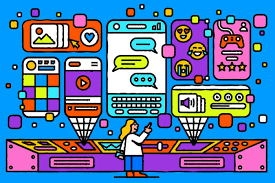M2D2: Blog #2: How New Literacies are Relevant to Us
Jilly Woodhouse
CURI-6010-B02: New Media and New Literacies
M2D2: Blog #2: How New Literacies are Relevant to Us
Article #1: Improving Digital Practices for Literacy, Learning, and Justice More Than Just Tools
Article #2: Digital Literacy: The skills that matter in adult education
Hey bloggers, let's dive deeper and continue this conversation on media literacy and why its fast emerging practices are making a huge impact on education and how our students receive and retain information. I am not the biggest fan of technology, however as I go deeper into research, I am heavily convinced on the effectiveness of media literacy and how I can use it to enhance my science instructions.
Main Ideas
The two articles I chose to review were “Improving Digital Practices for Literacy, Learning, and Justice More Than Just Tools” by the International Literacy Association and “Digital Literacy: The skills that matter in adult education” by Jenifer Venek. The main takeaway from the article “Improving Digital Practices for literacy, Learning, and Justice” is that it explains digital literacy instructions to be more than just teaching students how to use technology and media. It goes deeper into explaining the importance of using digital tools to curate context-rich learning experiences that reflect students’ real-world practices, experiences, and cultures (International Literacy Association, 2018). Both articles share common ideas that digital literacy promotes equitable access to learning opportunities for all types of learners, which drives engagement, communication, problem-solving, collaboration and enhances critical thinking skills.
Challenges
What’s surprising about the article "Improving Digital Practices for Literacy, Learning, and Justice: More Than Just Tools" is how strongly it challenges the common assumption that simply giving students access to technology is enough to improve learning. When I was first introduced to the digital literacy practices, I must admit that I misunderstood the goal, and thought research was implying that educators should completely switch to more media led instructions and move away from traditional class instructions. It also provided strong arguments to clear up any misunderstanding that media literacy is just a technical skill, but rather being used to push educators to think beyond apps and devices to consider whose voices are being amplified or silenced in digital spaces (International Literacy Association, 2018). The article “Digital Literacy: The skills that matter in adult education” surprisingly truly emphasised that media literacy goes beyond the classroom. Its hard push for student engagement, for me opened my eyes to a broader view of how justice-driven digital literacy is and its importance in today’s world where digital access and skills are closely tied to opportunity.
Science Education
As a science educator both articles support how valuable digital literacy is in the enhancement of science education. In science classrooms, this means leveraging technology to support inquiry, experimentation, and data analysis. The article also highlights the importance of critical digital literacy, which is essential in helping students evaluate scientific information and recognize misinformation. Science promotes high level information synthesis, so with media literacy it encourages students to evaluate the credibility of scientific sources and navigate misinformation which is an essential skill to have in today’s information-rich, and often misleading, digital environment.
Reference
International Literacy Association. (2018). Improving digital practices for literacy, learning, and justice: more than just tools. https://www.literacyworldwide.org/docs/default-source/where-we-stand/ila-improving-digital-practices-literacy-learning-justice.pdf
Vanek, J. (2019). Digital literacy. American Institutes for Research . https://www.air.org/sites/default/files/TSTMDigitalLiteracyBrief-508.pdf

Hi Jilly! I enjoyed reading your perspective as a science educator. I look forward to reading your upcoming assignments.
ReplyDelete